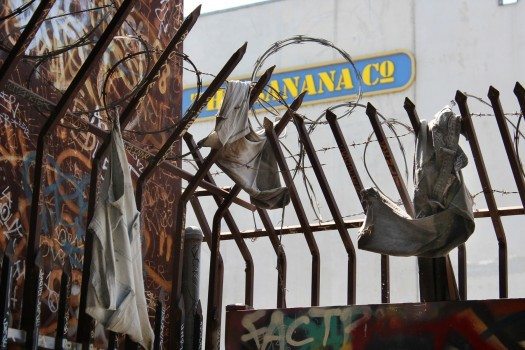

Read the Writing
Read the writing on the cinder block wall:
Joker, Jasper, Dopey, Termite, Tokes, Crow.
It’s not an “is it art?” debate, at all;
these are the monochromatic zip codes
of my gangster, tattooed, sharp-creased cousins.
Scribbled in black on a bus bench, strangled
names crossed out, over names crossed out again,
red under yellow under green tangled
like wire. Memo, Cowboy, Flyboy, Topper.
Neil Armstrong planted a flag on the moon;
it can’t be seen from their clearly marked world
where, if you don’t live there, you better run.
Tight fence of paint, like barbed wire that’s hidden.
Trespassed borders end lives, I’m not kidding.
Source: My Name on Top of Yours (2013),
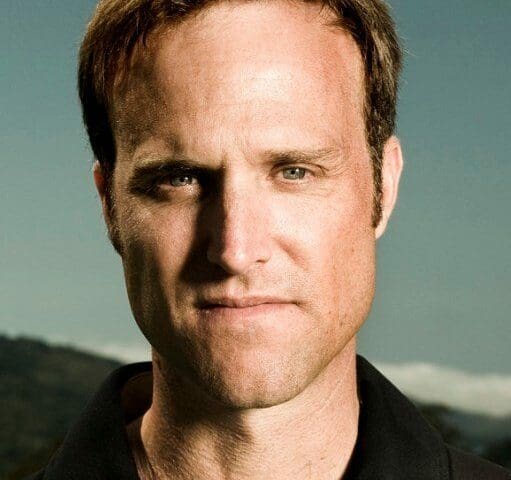

A revamped Hollywood Film Festival aims to bring cinema and activism together in L.A.
Activists, filmmakers and audiences alike have a reason to be excited about the 2014 Hollywood Film Festival that unspools this October. Under new management, the festival, which was founded in 1997, is shifting its focus to the socially engaged side of cinema and turning the spotlight on films with a message.
Jon Fitzgerald, who first managed the Hollywood Film Festival in 2013 and has experience putting on similar festivals around the globe, will return as the event’s organizer. This year, however, a separate organization he heads, CineCause, has acquired the festival and plans to give it a decidedly different tone.
Speaking to Capital and Main by phone from a documentary shoot in Florida, Fitzgerald said CineCause plans to remake the festival into a showcase for filmmakers who want to make a change.


Pity the poor, beleaguered Malibu homeowner. Median income over $135,000 is about two-and-a-half times the County average, and the average home’s value is so far past the County average that the Census Department literally doesn’t count that high. Good for them. But they’re also the NIMBY champs, they don’t like sharing funding with poor schools, and in their free time, folks in the ‘Bu go around erecting illegal signs to cheat you and me out of our right to access the public beach. They have it rough and, as the front page of the L.A. Times explained, Airbnb is making it worse.
Malibu homeowners have some reasonable points: “party houses” that disturb neighbors and probably violate zoning ordinances, and millions of dollars of lost city revenue. At the same time, it’s hard to get too worked up over the poor,
» Read more about: The Enemy of My Enemy Is Still a Jackass »


 People vacation on the Hawaiian island of Kaua’i to swim, snorkel and surf. And to unplug. We did. For three weeks. My wife and I also spent one Saturday night at a rally supporting a ballot initiative to control the use of Genetically Modified Organisms (GMOs) and pesticides on the island. Admittedly, not the most touristy thing to do.
People vacation on the Hawaiian island of Kaua’i to swim, snorkel and surf. And to unplug. We did. For three weeks. My wife and I also spent one Saturday night at a rally supporting a ballot initiative to control the use of Genetically Modified Organisms (GMOs) and pesticides on the island. Admittedly, not the most touristy thing to do.
Part of the draw was Makana, which means “gift” in Hawaiian, which he surely is. Makana has been hailed as Hawaii’s greatest young slack-key musician and songwriter. You may know him because he wrote a song, “We Are the Many,” that became the anthem of the Occupy Movement. Slack-key, which characterizes Hawaiian music, was the legacy of Mexican cowboys, who came to the island as contract workers over a century ago – the beginning of a long history of workers imported there from other countries.
We were also interested because we had stumbled across the anti-GMO movement while exploring the island a year ago.


When you hear about poverty wages and extreme anti-union tactics practiced by the largest company of its kind in the world, it’s natural to think of Walmart. But California-based Taylor Farms is giving the retail giant a run for its money when it comes to low-road labor practices, while offering another example of why it’s time for the U.S. to clamp down on the use of temp agencies by huge companies trying to evade responsibility for unconscionable working conditions.
Taylor Farms is the world’s largest producer of fresh-cut vegetables, and supplies some of the nation’s biggest fast food and grocery chains including McDonald’s, Subway, Pizza Hut, Safeway, Ralphs and Kroger. They operate in nine states as well as Mexico, and earned revenues of $1.8 billion in 2012.
A visit to the company website offers a bucolic image of a multigenerational family-run business with the highest ethical standards.
This afternoon the California State Assembly passed Assembly Bill 1897, which would hold companies accountable for violations of workers’ rights committed by their labor suppliers. The bill, sponsored by Assemblymember Roger Hernandez (D-West Covina), passed 45-20.
Gary Cohn recently wrote about AB 1897 for Capital & Main, noting that passage could have national implications for temporary workers and income inequality. Capital & Main’s Bill Raden and Cohn previously investigated such worker abuses taking place at agribusiness giant Taylor Farms. Labor advocates supported the bill, noting that major corporations have used staffing companies to dodge responsibility for sub-standard working conditions. Meanwhile, more than 50 business groups opposed the bill.
» Read more about: Breaking: Assembly Passes Bill to Hold Companies Accountable for Abuse of Temps »
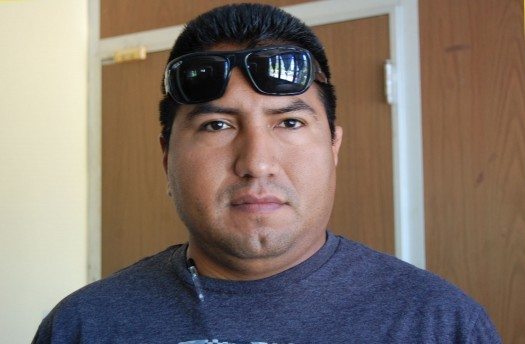

California wage earners received encouraging news Wednesday when Assembly Bill 2416 (Wage Theft Recovery Act) cleared a major hurdle by passing 44 to 27 on an Assembly floor vote — three votes more than needed to move to the Senate.
The measure, introduced in February by Mark Stone (D-Scotts Valley), is modeled after a successful Wisconsin wage lien law. It is designed to tie off loopholes in California that currently allow unscrupulous businesses to evade paying monetary judgments to thousands of shortchanged, mostly low-wage workers by simply transferring ownership or even by declaring bankruptcy.
According to a 2013 study by the National Employment Law Project and the UCLA Labor Center, of the 18,683 workers who filed claims for unpaid wages with the California Division of Labor Standards Enforcement (DLSE) between 2008 to 2011, only 3,084, or 17 percent, recovered any money at all.
In 60 percent of those rulings,
» Read more about: Proposed Wage Theft Law Passes Major Hurdle »
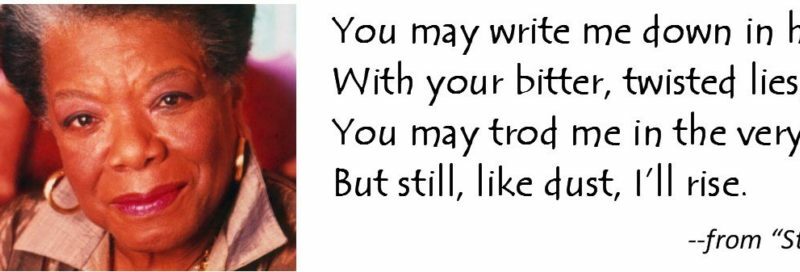


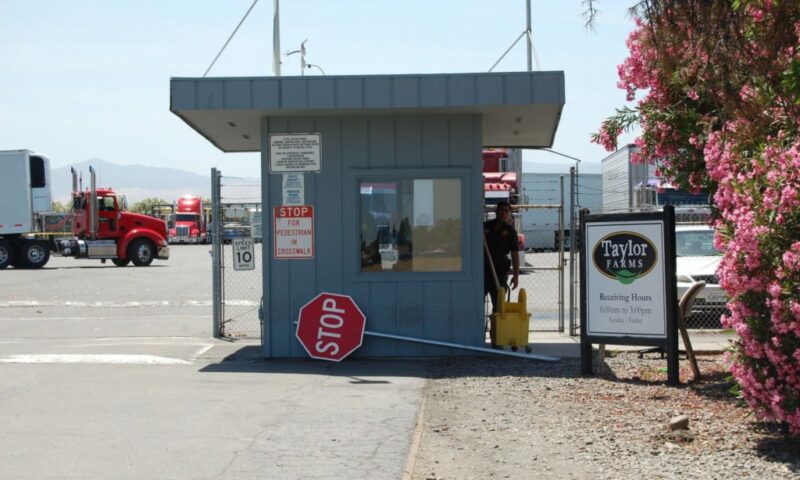
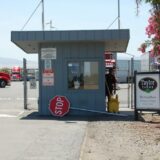
Last April, when Federico Lopez and his sanitation team were ordered to clean a Taylor Farms storage area, the 23-year-old didn’t like what he saw.
“I went into the hallway that they expected me to clean,” Lopez remembers. “There was pigeon feces, dead pigeons, dead bats and black mold. I’m certified for that, but the rest of my coworkers weren’t.” The crew had only been given dust masks for the job by the temporary labor contractor who employed them.
When Lopez raised concerns about the cleanup, he says Taylor Farms, which is the world’s largest producer of cut vegetables and salads, assured him everything was fine and not to bother with the mess. He says that later that evening, an equally unequipped and untrained night crew cleaned the room. Shortly after, Lopez was given his notice after only three weeks on the job.
This month Assemblyman Roger Hernandez (D-West Covina) heard Lopez’s and other stories in the Central Valley town of Tracy from about 200 mostly Latino Tracy Farms workers and family members.
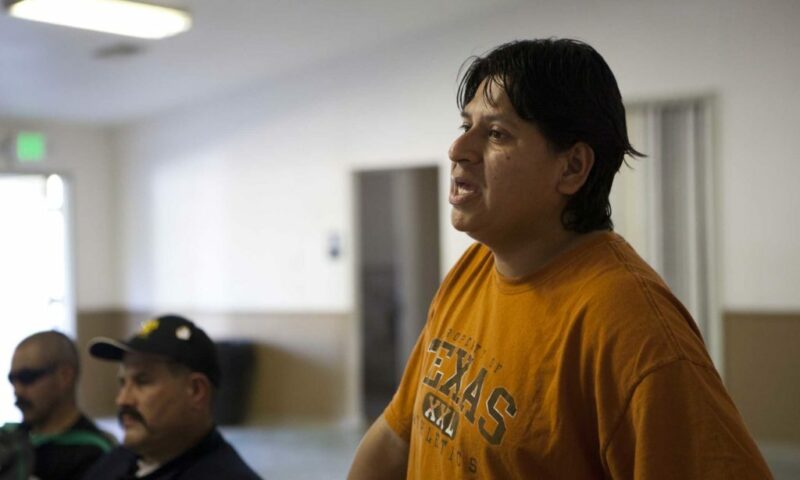
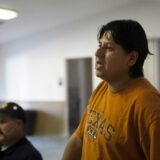
Unlike the Kelly Girls of years past, today’s temp workers are just as likely to be hired to fill blue collar jobs as office positions, with one major caveat: the new “temporary” hires who pick crops, pack vegetables or clean hotel rooms can work at those jobs for years at the same company — and with little or no advancement. And, according to recent research, that’s exactly the way some of America’s largest companies like it.
The practice has become so pervasive that California Assemblymember Roger Hernandez (D-West Covina) is pushing forward a bill, modeled on similar laws passed in Illinois and Massachusetts, intended to hold companies accountable for serious violations of workers’ rights committed by their own labor suppliers.
See feature story on temp-labor contracting at Taylor Farms
“As new jobs are added to the economy, employers are utilizing the subcontracted model known as ‘perma-temps’ to avoid accountability in the workplace,” Hernandez said last week.
» Read more about: Who’s the Boss? Proposed California Law Would Rein in Abuse of Temp Workers »